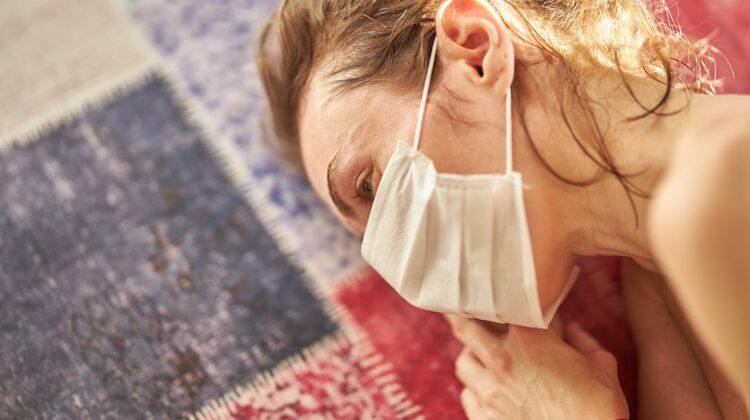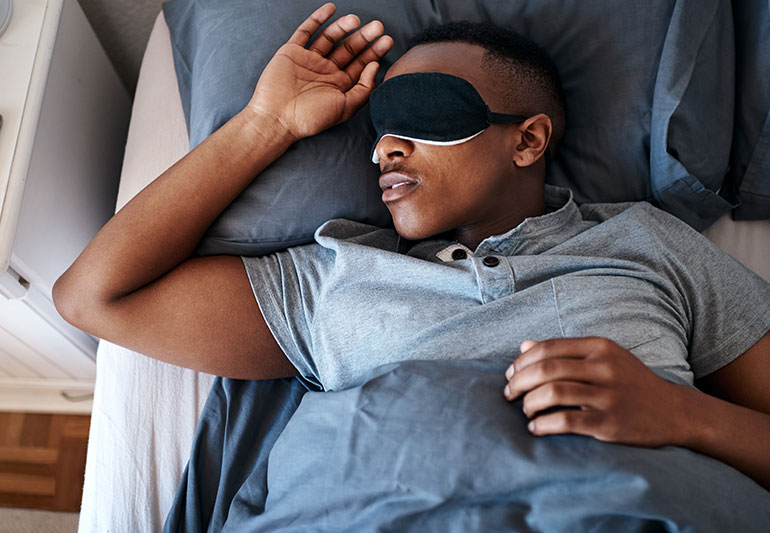
Getting a good night’s sleep is essential for feeling energized and alert the next day. But did you know that wearing a face mask while sleeping can help improve your quality of rest? But how can you sleep with a face mask on?
We’ll explore all things related to sleeping masks — from benefits to types and how-to tips. So grab your favorite pillow and get ready – we’re about to unlock some secrets on getting better shut-eye by learning how can you sleep with a face mask on.
Table of Contents
Can You Sleep With a Face Mask On?
Wearing overnight face masks while sleeping can provide numerous benefits, such as improved sleep quality and reduced exposure to allergens and pollutants.
Improved Sleep Quality
Wearing a nighttime face mask helps block out light that can interfere with your natural circadian rhythm. This is especially helpful for those who live in cities or near streetlights where there is more ambient light at night.
Additionally, wearing overnight face masks may help reduce noise levels which can also disrupt your sleep cycle. By blocking out these external factors, it will be easier to fall asleep and stay asleep.
Reduced Exposure to Allergens and Pollutants
Overnight masks act as an additional barrier between you and the environment around you. They are effective at trapping particles like dust mites, pollen, pet dander, and smoke particles from cigarettes or fires – all of which could potentially cause allergic reactions or respiratory issues if inhaled during the night.
A good quality face mask will filter out these airborne irritants so that you don’t have to worry about them disrupting your slumber.
Types of Face Masks for Sleeping
How can you sleep with a face mask on? There are several types of overnight masks to choose from, each with its own unique features and benefits.
Disposable Surgical Masks
Disposable face masks are the most common type of nighttime face mask. These single-use masks typically come in packs of 10 or more and feature elastic ear loops that fit snugly around your ears.
Disposable surgical masks are lightweight, breathable, and comfortable enough to wear all night long without feeling too hot or stuffy. They’re also great for people who suffer from allergies since they filter out dust particles, pollen, pet dander, and mold spores — making them ideal for those who want an extra layer of protection against airborne irritants while they sleep.
Reusable Cloth Masks
Reusable cloth face masks are another popular option when it comes to getting better sleep at night. They can be washed multiple times before needing replacement—making them both economical and eco-friendly.
Reusable cloth face masks usually have adjustable straps so you can customize the fit as needed. Some even come with nose clips or chin guards that help keep the mask securely in place throughout the night.
Specialty Sleep Masks
Specialty sleep masks are designed to provide a deeper level of restful slumber each night. These masks often come with additional features such as aromatherapy scents infused into fabric layers which release calming essential oils into the air for added relaxation before bedtime. They also help block out light completely, allowing you to drift off without any distractions from outside sources like street lights or passing cars.
From disposable face masks to overnight gel masks, there are many types of face masks available for sleeping. To make sure you choose the right one for you, consider your needs and preferences, look for breathability and comfort features, and check fit and adjustability options.

(Source)
How to Choose the Right Face Mask for You
When choosing the right face mask for sleeping, there are a few key factors to consider.
Your Needs and Preferences
When wearing masks at night, it’s important to think about what type of material will work best for your individual needs.
Disposable face masks may be more convenient if you don’t want the hassle of washing them after each use. Reusable cloth masks offer better breathability but require regular cleaning. Specialty sleep masks can also provide additional comfort features such as adjustable straps or extra padding around the eyes.
Breathability and Comfort Features
The most important thing when wearing masks during sleep is ensuring that it provides adequate breathability. Look for materials like cotton or silk which allow air circulation without compromising protection from allergens or pollutants in the environment.
Proper Fit
When choosing an overnight gel mask, make sure it fits properly so that it does not slip off or cause irritation while you’re sleeping.
Look for adjustable straps so you can customize the fit according to the shape and size of your face. This will help ensure maximum comfort while wearing masks overnight.
Make sure the straps don’t dig into your skin as you move around in bed. And look for masks with padding on the bridge of the nose to reduce irritation caused by pressure points during sleep.
Tips for Wearing a Face Mask While Sleeping
Wash your hands with soap and water or use hand sanitizer before putting on a face mask in order to reduce the risk of spreading germs. This will help ensure that you don’t accidentally contaminate yourself or others by touching your nose or mouth area after handling an unclean surface or object.
When selecting an overnight face mask, make sure that it fits snugly around your nose and mouth area without leaving any gaps where air could escape through. A good fit will also help prevent droplets from entering if someone nearby sneezes or coughs near you while you’re asleep.
Depending on how often you wear your face mask during sleep time, make sure to change it regularly (if disposable) or clean it (if reusable). Cloth masks should be washed in hot water and detergent after every use to ensure that they remain hygienic for reuse multiple times.
Conclusion
Can you sleep with a face mask on? Definitely!
In fact, wearing an overnight sleeping mask has plenty of benefits. It can help you get better sleep, reduce allergens in the air, and even improve your skin health.
Are you struggling to get a good night’s sleep? Do you often wake up feeling tired and unrested? WakeUpFresh.com is here to help!
Our guides provide step-by-step instructions on how to use face masks for better sleep so that you can finally experience the restful slumber your body needs. From tips on choosing the right mask for maximum comfort to advice about proper cleaning techniques – our team of experts will show you how sleeping with a face mask can help improve your overall quality of life.
Visit us today and start getting more out of each night’s rest!